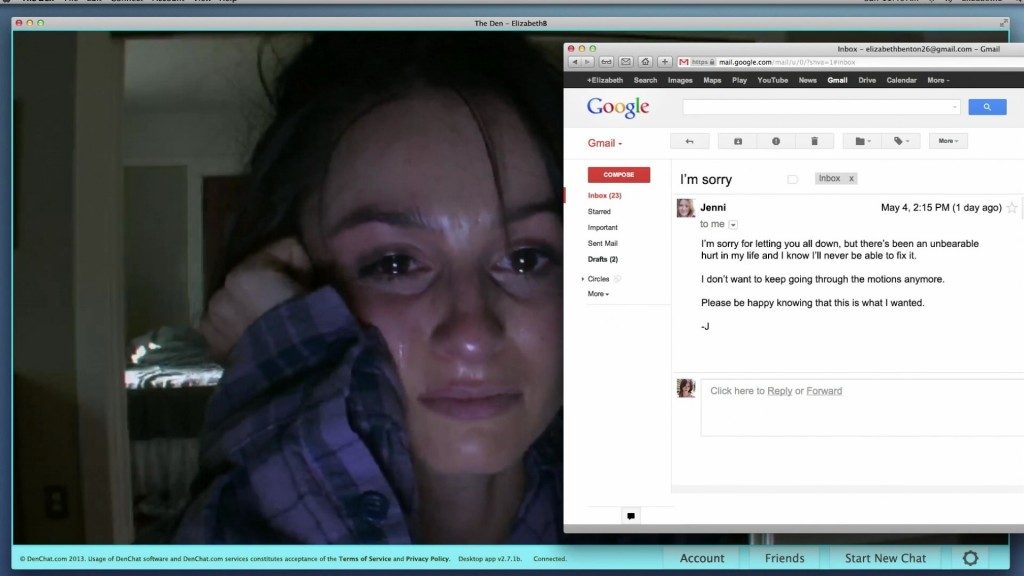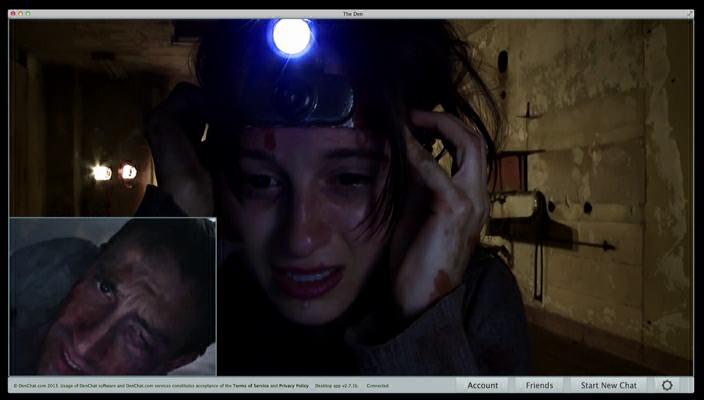The Den — a Death Online
Released in 2013, Zachary Donohue’s “The Den” is a nasty and tactile horror movie that uses screenlife in a way that predates “Unfriended” and “Unfriended: Dark Web.” Its screenlife storytelling is largely driven by video chats of all kinds, and it uses the expansiveness of the internet and the limited angles of a video camera to create a deep sense of fear.
The Den is like a Chatroulette-type of website, where millions of users can meet others from around the world, and have a video or text chat. As we see from interactions had by graduate student Elizabeth Benton (Melanie Papalia), it’s an unpredictable place, and one that brings out the stranger side of people because of the low stakes. That’s the point of her being on the site—to study human behavior through such an anonymous yet intimate platform—and it leads to all types of interactions. Some people are pleasant, like a woman in England that she chats with. And others are more perverted, like the two men who ask her for advice on how to please a woman. And of course, some users are sadistic, like a tense game of Russian roulette that’s revealed in one unsettling moment to be a complete joke. Donohue creates a vivid idea of the internet community with an array of random characters and their places, looking almost like the movie was made with Chatroulette itself.
As we watch Elizabeth’s interactions on her desktop, recording them for her own research, a sinister plot is revealed. Randomly one day on the feed she’s messaged by someone named PYAGIRL16, and when she clicks to have a video chat with them, Elizabeth shown a disturbing image: a woman bound and gagged, wriggling in a chair, screaming for her life. A masked person then slams the woman’s head down on the desk and viciously murders her before cutting off the feed. Given the unpredictability of the internet, a police investigator watches the footage Elizabeth had recorded, and shrugs it off. The murder looks real, but on the internet, it could just be people fooling around.

The scheme sets off a set of events not unlike a stalker movie, with Elizabeth trying to find answers by investigating the account that originally messaged her. More strange things start to happen—her friend Damien (David Schlachtenhaufen) sends a glitchy video, Elizabeth’s own account gets hacked into, and masked killers start to terrorize her loved ones. In the last act, the movie steps away from the website of The Den, and its desktop format, but continues to show horrific footage that would be captured with cameras by its characters.
“The Den” has some of the same conceits as other screenlife movies such as the constant usage of video (including characters walking around with their laptops and holding them at optimal viewing angle) and sound design that heightens an unexpected sound (like a sledgehammer hit). But “The Den” is a strong example of a movie toying with the possibility of camera-focused culture, like when in-peril characters are later shown to have cameras literally attached to their foreheads, documenting their terrified points-of-view.

Of all the films to focus on screenlife from a horror angle, “The Den” is one of the most intense, especially because of its graphic moments and strong jump scares. Donohue cuts away from scares at just the right moment to make you disturbed about what you’re not seeing, like when a masked individual pops up behind someone on a video chat before the feed dies. Like scrolling through a chat website, you’re never sure what you will see next.
As it creates a thriller largely out of video chats, it becomes clear the nastiness of the movie’s villains isn’t so far removed from the way people can be online. At the core of “The Den” is a strong sense of fear about the unknown in the internet, of who people can interact with, and what parts of their lives can be accessed. “The Den” goes along with movies like “The Cyberbully” and the “Unfriended” films by using that factor as a helpless unknown, as mixed with the vulnerability of technology—that anything can be hacked, and anyone can pretend to be someone else, so long as a device has an internet connection.

